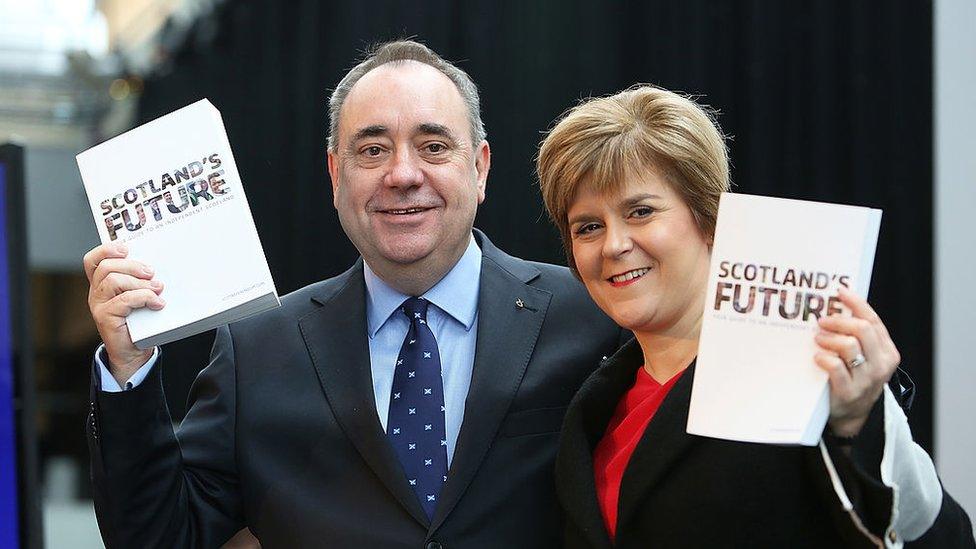A big week ahead for Nicola Sturgeon
- Published
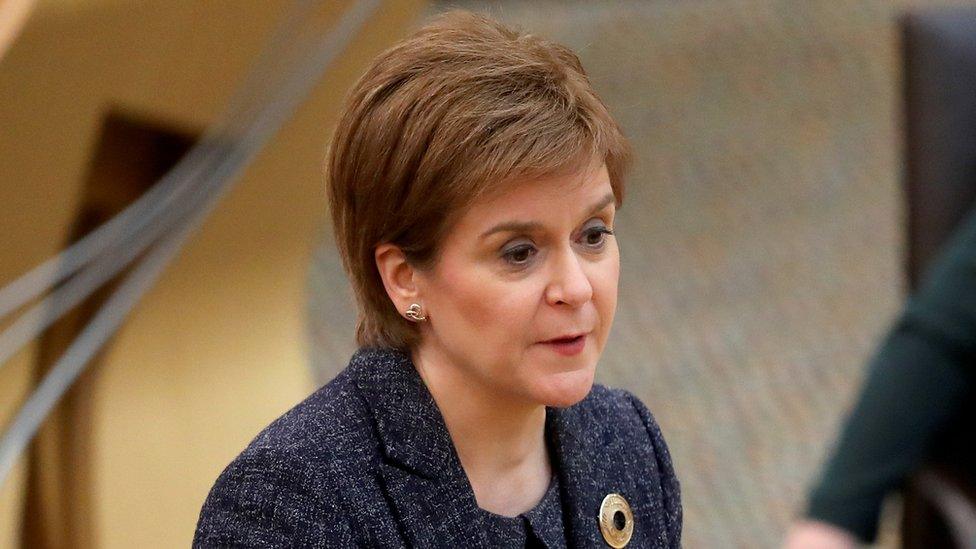
The spotlight is firmly on Nicola Sturgeon. With just days to go before the Holyrood election campaign, Scotland's first minister will learn on Monday whether an independent review has found she broke the rules of her office.

Toast. Fudge. Cleared.
That's not this week's menu in the Holyrood canteen but an unofficial summary of the possible outcomes of the independent inquiry upon which Nicola Sturgeon's political future depends.
The inquiry by Ireland's former chief prosecutor, James Hamilton, is to decide whether or not the first minister misled parliament or otherwise broke conduct rules for ministers.
It's his job to say if there has been a breach of the ministerial code, what punishment or remedy - if any - should apply and what changes might be needed to the code itself.
He has big calls to make just days before the start of a Holyrood election campaign.
In referring herself to Mr Hamilton for investigation, Nicola Sturgeon has effectively placed her reputation and political future in his hands. His conclusions cannot be easily dismissed or ignored.
If he decides she has broken the code by knowingly misleading parliament, for instance, she would be toast. That is to say, she would be expected to resign as first minister.
Alternatively, if he decides she had done her best in a difficult situation and does not have a serious case to answer, Nicola Sturgeon would, in effect, be cleared.
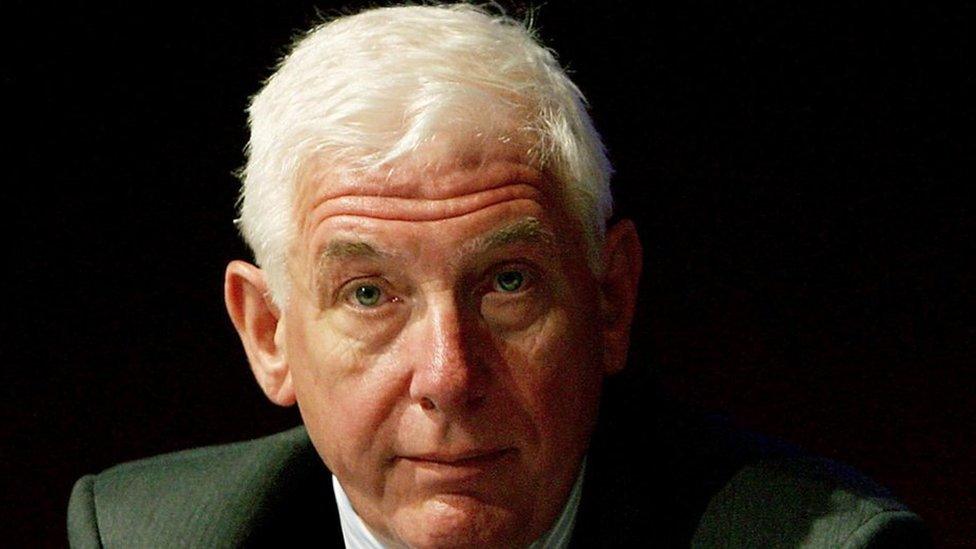
James Hamilton served as Irish Director of Public Prosecutions until 2011
In judging the competing claims of Alex Salmond, Nicola Sturgeon and their respective supporters Mr Hamilton may find it difficult to reach such a clear cut conclusion.
That leaves a great deal of scope for fudge - a blend of criticism for Nicola Sturgeon's opponents to use against her and caveat for her to deploy in her defence.
That, to many observers, seems like a likely outcome.
We know that when Nicola Sturgeon told parliament she first heard about the investigation into harassment complaints against Alex Salmond from him, she did not give the full picture.
She has subsequently acknowledged a meeting, a few days earlier, with Mr Salmond's former chief of staff during which the subject came up.
She has sought to distinguish between a general discussion which raised her suspicions and what she described as a shockingly detailed account from Mr Salmond which may have overwritten any prior knowledge.
If Mr Hamilton doesn't buy this account and decides the first minister misled parliament, he would probably struggle to conclude that she did so knowingly - the offence which would ordinarily require her resignation.
Why? Because Nicola Sturgeon claims to have forgotten the earlier meeting and only to have been reminded of it after she told parliament what she knew and when. It would be difficult for anyone to prove otherwise.
This is just one of several alleged breaches of the ministerial code James Hamilton has to adjudicate.
To be clear, no one except Mr Hamilton and those working closely with him, knows for sure what he will conclude.
His report is expected to be published and released on Monday.
It will be delivered first to the Scottish government because Mr Hamilton has been commissioned by them as the first minister's independent adviser on the ministerial code.
As the publisher, the Scottish government needs to check the text for any legal and data protection issues and redact it if necessary.
I am told they also need to get consent from those named in the report before publication which has the potential to cause delay.
However, the first minister has undertaken to publish on the same day as the report is received.
This week she will also have to deal with the findings of the Holyrood committee that's been investigating the Scottish government's mishandling of the original harassment complaints.
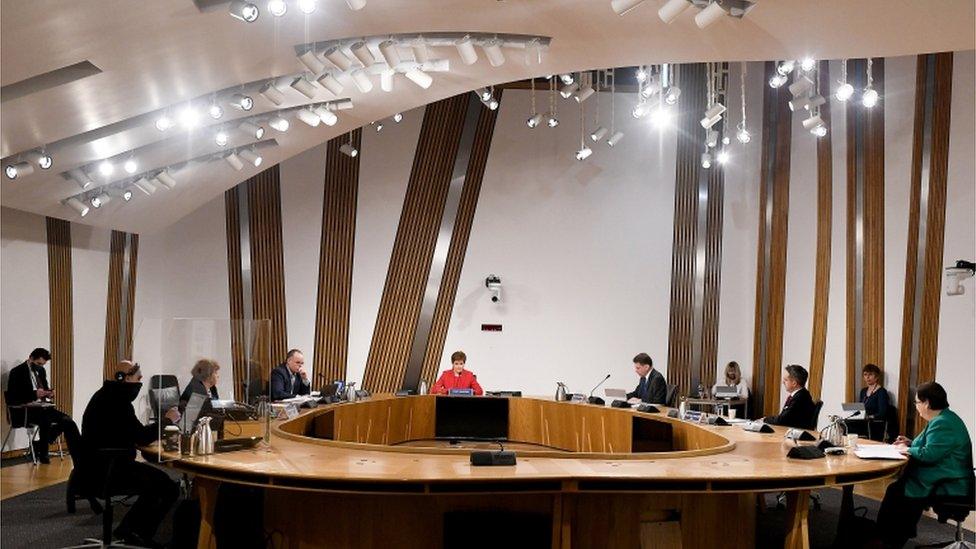
Nicola Sturgeon gave eight hours of evidence to the committee looking at what went wrong with the Alex Salmond harassment probe
We already know from a leak that the opposition majority on the committee has concluded that Nicola Sturgeon misled them in her account of a key meeting she had with Alex Salmond.
He and his lawyer claim she offered to intervene in the investigation in support of a mediated settlement. She and a member of her team deny that but the first minister has acknowledged she may not have been blunt enough in doing so.
Ms Sturgeon has sought to dismiss this finding as a partisan attack. Which is pretty much how she feels about the Tory approach too.
As the main opposition party, the Conservatives have already reached their verdict.
The party leader, Douglas Ross has been calling for Nicola Sturgeon's resignation since the eve of her eight-hour evidence session before the Holyrood inquiry.
Unless she has quit by Tuesday, he will demand a vote of no confidence in parliament on Wednesday, which the first minister could be expected to survive with the support of the Greens.
And with that, the fifth session of the Scottish Parliament will end and the parties will take their arguments into a six-week election campaign.
Alongside coronavirus recovery and Scotland's constitutional future, truth and trust is likely to become one of the defining issues.
Last year, Nicola Sturgeon told me in an interview she would definitely lead her party into this contest and would definitely serve a full term as first minister if the SNP are re-elected.
At the time, when the first minister was being lauded for her handling of the pandemic, my questions probably seemed a bit daft. Not so now.
The toxic feud between Nicola Sturgeon and Alex Salmond has the potential to cause the first minister and her party serious political damage.
The extent of that and the potential for recovery will depend, of course, on the findings of the independent inquiry and how Nicola Sturgeon responds to them.
As Holyrood election campaign curtain-raiser's go - there has not been one as dramatic or highly charged as this.
Related topics
- Published19 March 2021
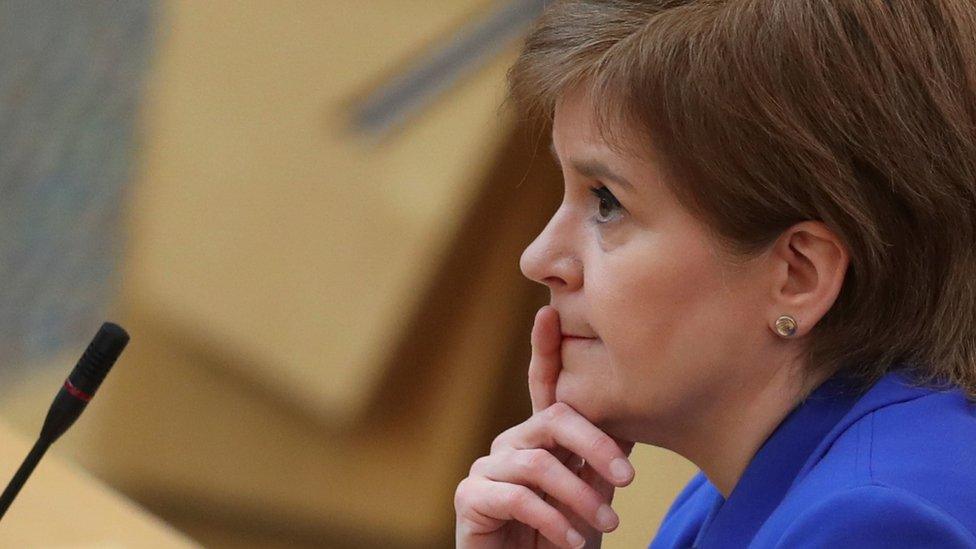
- Published18 March 2021
- Published23 March 2021
